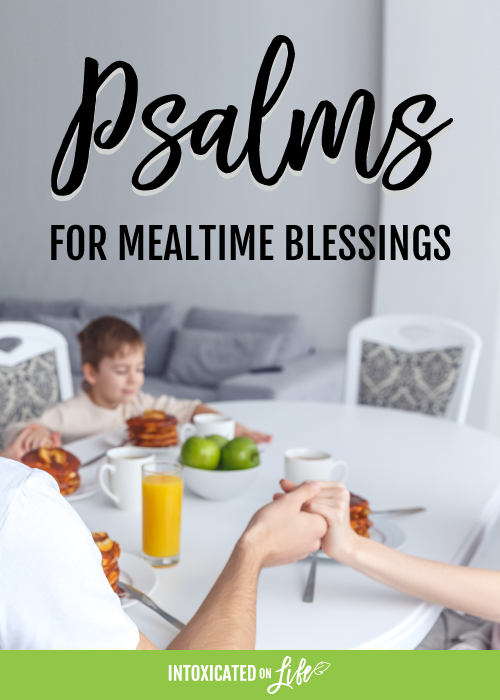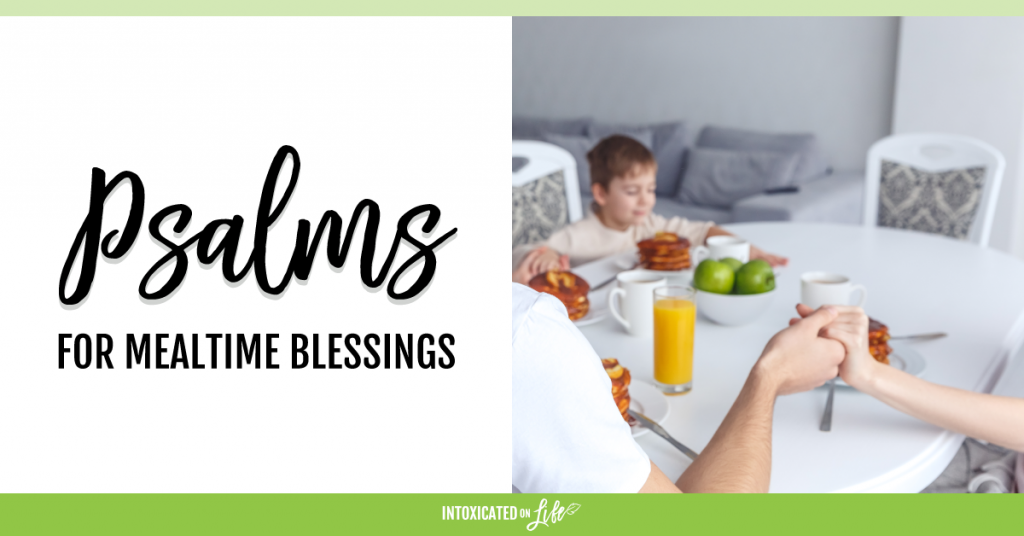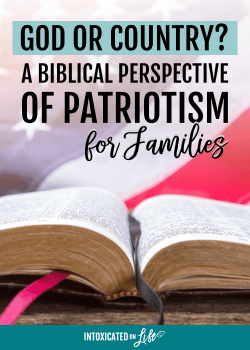There are some wonderful Psalms to Use for Mealtime Blessings for your family.
“God is great, God is good…”
“Bless us, O Lord, and these thy gifts…”
There are a number of good traditional Christian mealtime blessings out there, but why not use meals as a opportunities to also teach Bible verses? There are three really great Psalms to use for mealtime blessings. Let’s look a bit closely at them together.
Tip: post one of these psalms in your dining area and recite it during meals. Or post all three: one for breakfast, another for lunch, another for dinner. If you recite these before every meal, your children will know them by heart before you know it.
3 Great Psalms to Use for Mealtime Blessings
Psalm 136:1-3, 23-26
In Jewish families, this psalm is called “the Great Hallel” (praise), and it is traditionally recited during the Passover meal. Psalm 136 celebrates God as Creator and Rescuer. It speaks of God’s supreme lordship over the universe, His creative power, and His mighty acts during Israel’s exodus and wilderness wanderings.
Psalm 136 is also a call-and-answer psalm (antiphonal). It was written to be recited by two groups of people. The first group recites a line and the second responds with “for his steadfast love endures forever.” This can make for a very engaging mealtime blessing: parents can recite the first line, and children can respond.
Use as much of the psalm as you like for your thanksgiving prayer, but be sure to include the last two verses, which state, “he who gives food to all flesh…Give thanks to the God of heaven” (Psalm 136:25-26).
Psalm 104:14-15, 27-31
Psalm 104 is a great Psalms to use for mealtime blessings. Charles Spurgeon called this psalm “a poet’s version of Genesis” because it echoes the six days of creation.
The grand theme of this psalm is God’s providential care of His creation. God is celebrated as the one who created the world and sustains it by causing streams to flow, plants to grow, and the sun to rise and set. All of creation is utterly dependent on God’s provision: He opens his hand and fills the world with good things (v.28).
Reciting verses 14-15 are particularly suitable for mealtime blessings because they reminds our children about the natural processes God orchestrates to bring food to our tables. God causes mountain streams to flow into rivers, watering the ground, causing plants to grow, allowing man to cultivate the ground for livestock, crops, and vineyards. God does this that we “may bring forth food from the earth and wine to gladden the heart of man, oil to make his face shine and bread to strengthen man’s heart.”
Psalm 145:14-21
King David evidently composed this psalm to be memorized: he wrote this psalm as an alphabetical acrostic, meaning each line begins with a letter of the Hebrew alphabet in sequence, making it easier for Hebrew worshipers to recite it by heart. Interestingly, it is the only psalm with the words “of praise” in the title—the entire song is nothing but praise.
This psalm mentions the importance of the older generation imparting the truths of God to the next (v.4), but also gives a sober reminder to parents. We are not merely to teach our children about God, but rather we should model what it means to praise God in front of our kids. We are to “extol” Him (v.1), “greatly praise” Him (v.3), “declare” what God has done (v.4), and “celebrate” God’s abundant goodness (v.7). John Piper says it this way,
“Teachers and parents who do not exult over God in their teaching will not bring about exultation in God. Dry, unemotional, indifferent teaching about God—whether at home or at church—is a half-truth, at best. It says one thing about God and portrays another thing. It is inconsistent. It says that God is great, but teaches as if God is not great.”
We are in good company if we teach our children to recite this psalm, especially for mealtime blessings. Many observant Jews pray this psalm three times a day. In addition, in the ancient church this song was sung during the midday meal, specifically because of verses 15-16: “The eyes of all look to you, and you give them their food in due season. You open your hand; you satisfy the desire of every living thing.”
What is your favorite chapter of Psalms to use for mealtime blessings?












I attend a church where we sing Psalms exclusively. Growing up we sang Psalm 104 at mealtimes and at church, we sometimes sing Psalm 145 before a meal. My daughter, who will be three in August, has already memorized some of the Psalms I sing with her before bed. It’s wonderful to see.
It is wonderful to see kids begin memorizing scripture so young and using music to do it makes it so fun and easy 🙂
Thank you for providing the Scripture posters and the extra information about how others have used the Psalms in history! I also enjoyed the comment about teaching the kids the psalms through music….would you happen to have a link to these psalms set to music?
Thank you so much for these beautiful verses! I plan to frame them and place them in the dining room. Blessings to your family.